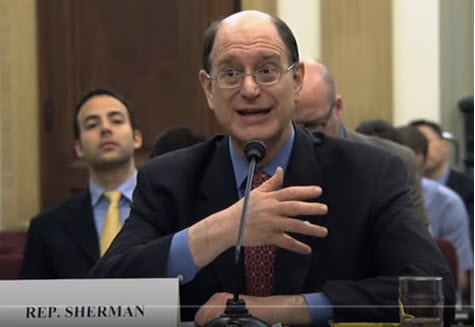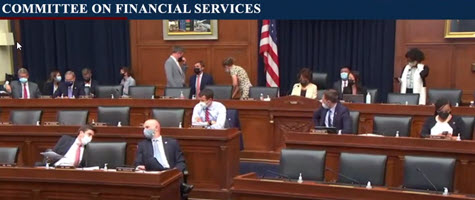
Legislation advanced this week by the House Financial Services Committee would help smooth the transition away from the London Interbank Offered Rate (LIBOR) as a reference rate for financial contracts. (House Financial Services Committee markup documents and videos, July 28 | Rep. Brad Sherman (D-CA), above)
Why It Matters
- Libor is currently used in many outstanding financial contracts – including commercial real estate debt, mortgages, student loans and derivatives – worth an estimated $223 trillion. (Committee memo, page 6)
- The use of LIBOR for new contracts is scheduled to terminate at the end of 2021. Additionally, all LIBOR maturities will stop in June 2023, although some will cease at the beginning of next year.
- The Adjustable Interest Rate (LIBOR) Act of 2021 was sponsored by Rep. Brad Sherman (D-CA) – chair of the Subcommittee on Investor Protection, Entrepreneurship, and Capital Markets. The bill would authorize the Federal Reserve to issue rules to "establish a clear and uniform process on a nationwide basis for replacing LIBOR in existing contracts,” with replacement benchmark rates. An amendment to the legislation was also approved during the Financial Services Committee July 29 markup.
- The bill would also provide a safe harbor for market participants switching existing LIBOR-referencing financial contracts over to a replacement benchmark for debt instruments. This would apply to instruments such as floating-rate bonds, which require all parties to agree to terms that cannot easily be changed. The bill also includes a federal preemption.
- Treasury Secretary Janet Yellen and Federal Reserve Chair Jerome Powell recently told the Financial Stability Oversight Council that Congress urgently needed to pass legislation to allow for a smooth transition away from LIBOR. (Bloomberg, June 11)
- Additionally, the Fed’s Alternative Reference Rates Committee (ARRC) yesterday endorsed use of Secured Overnight Financing Rate (SOFR) Term Rates, a forward-looking version of the LIBOR alternative for financial instruments. (Bloomberg, July 29)
- As Federal Reserve Vice Chair for Supervision Randal Quarles continues to encourage the termination of the use of LIBOR by year-end, the House bill and the ARRC endorsement of SOFR Term Rates are intended to provide market participants with the tools they need to transition away from LIBOR.
Roundtable Support

- The Real Estate Roundtable and 17 national trade groups on July 27 submitted a letter to House Financial Services Committee policymakers in support of legislation to address “tough legacy” LIBOR contracts during the transition away from the benchmark. (Joint Trades’ Letter on Libor)
- The joint letter noted that currently, there is no realistic ability to modify legacy contracts that cannot be converted to a non-LIBOR rate or be amended with adequate fallback language before all LIBOR maturities are scheduled to stop in June 2023.
- The coalition letter stated, “A state-by-state piecemeal approach does not provide the necessary comprehensive protections that is achievable at the federal level given importance of the issue and the very limited time remaining until LIBOR’s end in less than two years.”
The letter also commended Rep. Sherman and the Committee for providing a meaningful legislative solution in support of the LIBOR transition by providing fair, equitable and consistent treatment for all tough legacy contracts.
# # #

